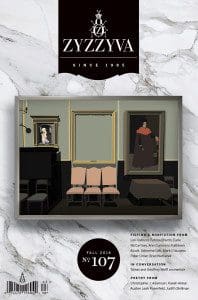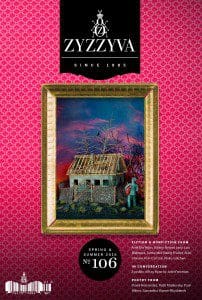In Anne Raeff’s story collection, The Jungle Around Us (140 pages, University of Georgia Press), nine stories span decades, covering numerous lives and multiple “jungles”; urban, Amazonian, and metaphorical, to name a few. In these “jungles,” Raeff’s characters face a Russian nesting-doll of isolation. Here, the land itself is alien to those displaced far from their homes. Language barriers and internal turmoil prevent communicating fully with those around you. But Raeff also shows how these same places can be a shelter, a refuge for embracing or experimenting with aspects of oneself that may have otherwise been ignored or hidden. Some […]
Category: Interviews
Interviews with current and past contributors, as well as other writers, poets, and artists
In Conversation with Geoffrey and Tobias Wolff, ZYZZYVA No. 107, Fall Issue
by me
 The following is the introduction from a conversation between our contributing editor Andrew Foster Altschul and Geoffrey and Tobias Wolff. You can read an excerpt of their conversation following the introduction, and, of course, can read the conversation in its entirety in Issue No. 107, which you can buy here.
The following is the introduction from a conversation between our contributing editor Andrew Foster Altschul and Geoffrey and Tobias Wolff. You can read an excerpt of their conversation following the introduction, and, of course, can read the conversation in its entirety in Issue No. 107, which you can buy here.
It’s hard to think of a pair of writer-siblings as celebrated, or as prolific, as Geoffrey and Tobias Wolff. Between them, they’ve written nineteen books, including novels, short-story and essay collections, and a travel narrative. But it was their acclaimed memoirs Geoffrey’s The Duke of Deception (1979) and Tobias’s This Boy’s Life (1989)—that first earned them wide readerships. The brothers’ parents split up when Geoffrey was twelve and Tobias was five, and they grew up separately: Geoffrey with their father and Tobias with their mother. The memoirs deal with their unusual childhoods, from perspectives that overlap only occasionally—the brothers did not really get to know each other until they were young adults. Over their careers, both have won numerous accolades and have risen to positions of prominence in academia—Geoffrey as the director of the graduate writing program at the University of California at Irvine, Tobias as professor of English at Stanford University. I am one of only a few writers lucky enough to have studied with both Wolffs. In 2012, I invited them to the Center for Literary Arts at San Jose State University for a public conversation about memory, family, and the precarious art of writing one’s own life.
[…]
The Opportunity to Understand What’s Different: Q&A with Christine Sneed
by Paul Wilner
Over the course of a relatively short but extremely productive literary career, Christine Sneed has already achieved a substantial, and enviable, body of work. Her first story collection, 2009’s Portraits of a Few of the People I’ve Made Cry, was awarded the AWP Grace Paley Prize and long listed for the Frank O’Connor International Short Story prize. Both for its attention to detail, and its close, caring, but unsentimental attention to the complicated lives of women (and men), Portraits is in Paley’s spirit at the same time as it honors the tradition of what O’Connor called “the lonely voice’’ that […]
‘Conjectures Based on What You Know About Yourself’: Q&A with Chelsea Martin
by Zack Ravas
“Being unemployed feels like being in The Sims’ Build Mode, but with less soothing music.” So declares the nameless narrator at the heart of Mickey (200 pages; Curbside Splendor), the new book from Chelsea Martin. As Mickey opens, its main character – a struggling young artist – impulsively breaks up with her long-term boyfriend and is soon fired from her job. These events springboard our hapless protagonist into ruminations on grand existential concerns like the struggle to pay rent, the inherent loneliness of the human condition, and why cheese and crackers are so damn important at gallery showings. Mickey is […]
‘We Can Work Harder to Mourn’: Q&A with ‘Grief Is the Thing …’ Author Max Porter
by Ismail Muhammad
Max Porter’s experimental novel Grief Is the Thing with Feathers (128 pages; Graywolf) follows a father and his two sons as they come to grips with their wife and mother’s sudden death. They do so with the help of an unusual houseguest: Crow, an anthropomorphic projection of the father’s obsession with Ted Hughes’ 1970 poetry collection Crow. Part mythic trickster, part grief counselor, Crow leads the family through an idiosyncratic and irreverent mourning. His air of mischievousness colors the entire novel, lending it a kaleidoscopic tone that renders the mourning process unrecognizable. For Porter, who works as an editor at […]
‘If You’re Going to Tell the Story of Slavery, I’m Going to Listen All Day’: Q&A with ‘Homegoing’ Author Yaa Gyasi
by Ismail Muhammad
Yaa Gyasi’s recently released and critically acclaimed first novel, Homegoing (320 pages; Knopf) moves from late 18th century West Africa to 21st century California, tracking the repercussions of the Trans-Atlantic slave trade. Gyasi, a graduate from Stanford and the Iowa Writers Workshop, and whose book was just named to the longlist for the 2016 Center for Fiction First Novel Prize, illustrates how slavery and white supremacy shaped life in the African diaspora by exploring the history of a single family—one branch of which remains in what eventually becomes Ghana, while the other experiences the turbulent history of African America. By […]
The Pain Hard to Name: Q&A with ‘Swallowed by the Cold’ Author Jensen Beach
by Will Howard
The stories in Jensen Beach’s second story collection, Swallowed by the Cold (208 pages; Graywolf Press), demonstrate again and again that self-destruction doesn’t happen in a vacuum. In “Kino,” we meet a young man named Oskar who swears he intended to torch just his own boat, but who ended up setting fire to an entire marina. Oskar happens to work at what seems to be a gay brothel called Kino Club, which an uptight man named Martin frequents. The two encounter each other at a party where Martin’s wife, Louise, gets too drunk. Suffering under the weight of Martin’s self-denial, […]
A Profile of Kay Ryan by John Freeman: ZYZZYVA No. 106, Spring/Summer
by editor
 John Freeman is the author of How to Read a Novelist (FSG), the editor of the literary journal Freeman’s, and a contributing editor to ZYZZYVA. He is also a poet whose work has been published in The New Yorker and ZYZZYVA, and is currently working on a book about American poetry.
John Freeman is the author of How to Read a Novelist (FSG), the editor of the literary journal Freeman’s, and a contributing editor to ZYZZYVA. He is also a poet whose work has been published in The New Yorker and ZYZZYVA, and is currently working on a book about American poetry.
His feature on former U.S. poet laureate and longtime Bay Area resident Kay Ryan—set at a restaurant in the Presidio on a warm San Francisco day—launches a new component of ZYZZYVA: author profiles and conversations. (In our next issue, we’ll be publishing a conversation on memoir between Andrew Foster Altschul and Geoffrey and Tobias Wolff.) The following is an excerpt from Freeman’s profile. You can read it in its entirety in Issue No. 106, which you can order here.
[…]
Realism’s Inability to Portray Reality: A Q&A with ‘Man & Wife’ Author Katie Chase
by James Shrieve
An internal refugee crisis in the United States; a modern America that tolerates decades-old, interfamilial vendettas; a city that keeps burning down year after year—these are the kinds of warped worlds captured in Katie Chase’s story collection, Man & Wife (220 pages; A Strange Object). Within these surrealities, Chase exaggerates societal traditions into distended proportions, focusing on the experiences of women at pivotal moments in their youth, examining their family dynamics, and, concurrently, their strange societies’ shifting norms. What’s even more unsettling is how eerily similar these worlds (and all the dramas that exist within them) are to our own. […]
Healing the Phantom Pains Through Poetry: Q&A with Noelle Kocot
by Maggie Millner
I turn to the poems of Noelle Kocot for the same reason I entered corn mazes as a kid: both are pleasurably unpredictable, and both transform everyday places into thrilling twilight zones. Though Kocot’s writing has covered a great deal of formal and conceptual terrain over the course of her seven books, her work has remained whip-smart and darkly playful, consistently carrying off great feats of imagination while orbiting an urgent emotional truth. These hallmarks are present in the restless quatrains of her Levis Poetry Prize-winning first collection, in the unflinching elegies for her late husband in Sunny Wednesday, and, […]
The Inheritance of Trauma: Q&A with Adrienne Celt & Esmé Weijun Wang
by Christian Kiefer
I’m not entirely sure where I happened upon Adrienne Celt’s beautiful first novel, The Daughters (272 pages; Norton/Liveright), which is out in paperback in early June, but entering its world was like entering a beautiful fever dream: ornate, occasionally frightening and sad. Celt’s world, peopled by four generations of Polish and Polish American women, tells the story of Lulu, a famed opera singer who loses her voice and sifts through her family’s stories to locate a way forward for herself and her newborn daughter. Celt’s work has appeared in Esquire, the Kenyon Review, and her story “Big Boss Bitch,” a […]
Forms of Self-Interrogation: Q&A with ‘Emergency Brake’ Author Ruth Madievsky
by Maggie Millner
In Ruth Madievsky’s Emergency Brake, a body is never just a body. Rather, it is a looted ship, a lit match, a bedtime story, a lamp. In other moments, the body is known only by what it contains: a rope, a salted pretzel, “the sound of a penny thrown in a blender.” Madievsky’s poems put domestic objects to work, personifying and reframing embodied experience like puppets with the poet’s hands inside. And in her fiery first collection, published by Tavern Books as a Wrolstad Contemporary Poetry Series selection, her talent for analogy is on full display. In addition to a […]
